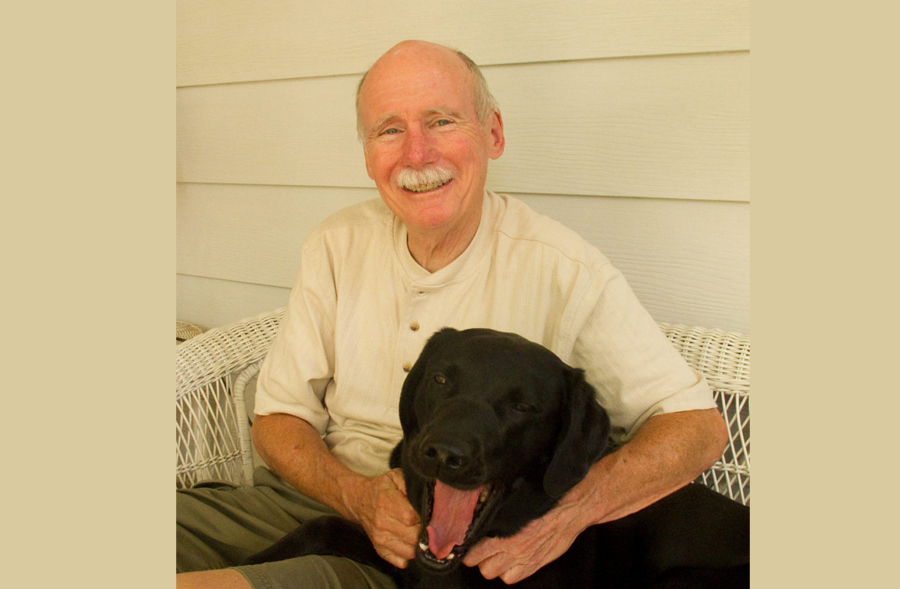
Michael Gaspeny knows secrets. He knows lives. He knows what makes people smile, and what makes them sin. He knows what makes people tick, and what makes them stop ticking, because he is sitting right beside them when it happens.
“Every time I walk into a nursing home I am taking a journey,” Michael recently told me.
About 15 years ago, after his father passed away, Michael became a hospice volunteer. At around the same time, he started writing poetry, and several poems in his 2013 book Vocation were inspired by his hospice patients. He won the 2012 Randall Jarrell Poetry Competition, the 1998 O. Henry Festival Story Contest, and reads regularly around Greensboro, North Carolina, where he presently lives with his wife, the novelist and essayist, Lee Zacharias. Michael and I met at a writing conference in Los Angeles. Naturally, I was drawn to his subject matter. During a long and enjoyable phone conversation, Michael discussed the mingling of his two passions, hospice and poetry.
First hospice patient…
My very first patient was on July 4th, he was a cancer victim. I showed up and rang the doorbell, he was on oxygen and looked horrible. Turns out his wife had just cut off the tip of her finger while cutting onions to make him a hotdog. Blood was shooting out. You’re never supposed to leave the patient alone, but I had no choice, I took her to the hospital.
How do you handle building friendships with these people, then losing them, time after time…
I realized my hospice patients meant so much to me that I must somehow try to remember them when they are gone. What I do is associate a certain location to each patient, and when they pass, and later on I pass that location, I say a prayer. I have a template, but each prayer is different, a reflection of that unique person. I always want to express gratitude for the particular virtues and challenges that person presented to me. I have done this for 14 years, and now when I drive through town I pass one shrine after another—I am praying often when I am driving, which is kind of a distraction. In some nursing homes I have as many as six or seven patients that have died. When I arrive I don’t have time to say a prayer for each person, but I’ll remember them all, I have a roll call, and I’ll go through each person and comment on them.
Tell me about Sherman, one of several hospice patients you’ve written poems about…
Sherman was a member of Cannonball Adderley’s entourage. He used to pal around Manhattan with Frank Sinatra. At one point he ran a newsstand outside Richard Nixon’s apartment complex in DC, and he made friends with him. He had a real gift. Sherman lived for jazz, and loved to be in jazz lounges up and down the East Coast. He was a very heavy drinker and smoker, and a skirt chaser of supreme ability. When I met him he had lung cancer and various other forms of cancer, but he wanted to go out flaming. He would go into these dance routines, dancing around and panting heavily. Sometimes I thought he was trying to die in front of me—because in hospice, you don’t resuscitate. I imagine I’d just have to hold his hand and watch him go.
Sherman taught me so much about music. He had like 5000 vinyls. “I’m not going to play anything you know,” he’d tell me. “I am going to play something you’ve never heard of.” But there was a ferocious lion-like aspect too. He had a wacky knowledge about tribe, and would start going off on segregation, ranting about injustices that had occurred with some tribe or another, and he would get very heavy. He became like the god of wrath, and I would have to sit there and absorb the wrath. I’d come out of there some days not even knowing who I was, like I had just been psychologically battered. It was a very intense relationship.
How did Sherman’s poem come about…
I always wanted to keep a record of the music we played each day, and I would go home later and write things down. Taking notes on the music made me think, I want this guy to live. I don’t want him to live in real life, he wants to go and I want him to go, but I want him to live on in the poem. It was after he passed that I wrote the poem. It’s like a eulogy. What I wanted to do in the poem was put the reader there in front of me, to experience all of it, to have them know Sherman like I knew him.
Sherman’s Groove – by Michael Gaspeny
Sundays Sherman schools you
On The Unsung Heroes of Jazz—all vinyl.
House Rules:
Anyone you’ve heard he won’t play
Don’t lie to look hip
Don’t ask him to turn it down
Don’t tell him
On behalf of his cancerous lung and lagging heart
To slow down on the Camels, Martel, and Tsingtao;
He will smoke and drink throughout.
The doctor gave him three months six months ago;
The Do Not Resuscitate sign’s posted on the wall
Next to Dowson’s “Days of Wine and Roses.”
Just listen to today’s program—
A piano player with a shriveled left hand;
A drummer who became a missing person;
A sax man who blew his stack on stage;
A trumpet player deprived of his embouchure
By a loan shark’s brass knuckles.
Sherman’s show hits your head
Like communion wine when you were a kid.
On the way home, everything sounds dead
Except birdsongs and the calls of sanctified women.
But once the key clicks, you’re back in the pocket—
A bass line strolls in the radiator;
Down the drain drums the dish water;
A shot of Scotch croaks like a baritone sax.
You know Sherman’s right—
Brilliance is buried in every bargain bin;
Ending isn’t dying.
But those are the beginner’s lessons.
Now it’s time to work on changes
Because Sherman’s dancing
To Johnny Lytle’s “Coroner’s Blues”—
A foxtrot leads to tap and a jig;
Then to show he’s got it all,
He spins into Temptations’ steps,
Hammer Time, and a rapper’s strut.
You ache to stop him,
To fly off the sofa as he whirls,
Woofing and whacking your hand,
But you freeze that fake smile
And keep still
Because he’s The Man
This is his groove
And it says on the wall you can’t call
Till the living end.










eturner
Hey – I know this guy, but I hadn’t seen this poem – not a surprise, because his poems always have that edge of plain talk and extraordinary insight to the human conditions, one and all. Lucky to know him!! Lucky to hear him read!